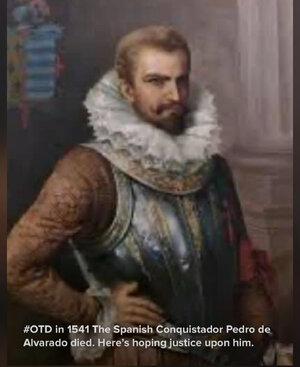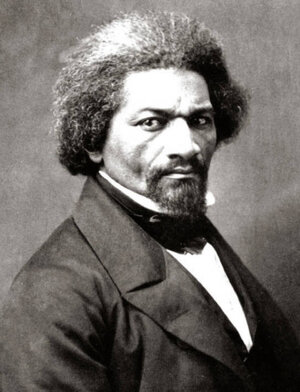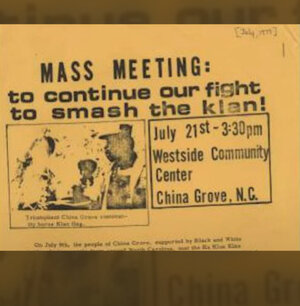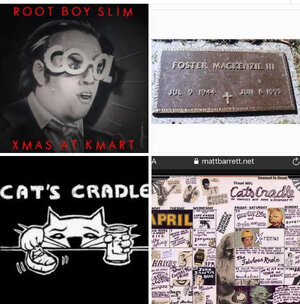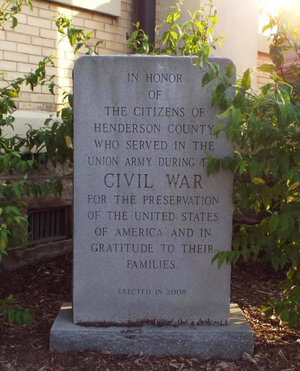
In 1864 Western North Carolina and Buncombe County’s Civil War-time Governor Zebulon Vance commented on the situation in North Carolina, stating that "the great popular heart is not now and never has been in this war. It was a revolution of the politicians, not the people." Vance grew up outside of Weaverville-the primary reason that the now removed monument to him was located in
#Asheville. A few years ago we took a family trip to a street fair in Hendersonville
#WNC, only about 45 minutes from Weaverville, where we had settled for a time. Henderson County has an impressive county courthouse, and it is ringed with monuments to veterans who fought in our endless wars.
But there’s a ‘different’ sort of remembrance on those grounds-It reads: “In Honor of the Citizens of Henderson County who served in the Union Army during the Civil War for the Preservation of the United States of America and in Gratitude to their Families. Erected in 2008.” (Mentioned here in this illuminating piece by super investigative journalist and Western North Carolinian, Jon Elliston, (
For historians documenting WNC’s Civil War monuments, the past is not always set in stone )
The true story is that North Carolina was home to a significant anti-war effort during the Civil War. Quakers (historically pacifist AND abolitionist), other Abolitionists, non-slave owning Yeomen farmers, as well as coastal fishermen and sailors, all seeing no reason to fight or die for the institution of slavery resisted in goodly numbers. Some joined an underground movement called ‘The Heroes of America’ or ‘The Red Strings’ that worked to undermine the Confederacy and the Pro-Slavery cause. The story of the anti-war Tar Heels is not well-known but they operated in the mountains, the Piedmont, and on the coast. I sometimes see loud, jacked-up, black smoke billowing trucks flying Confederate flags in Buncombe and Madison Counties, clearly out to make a statement. I wonder what statement regarding that very same flag was made by their Western North Carolina ancestors, many staunchly anti-war and anti-Confederacy like their Henderson County neighbors?
A good friend told me that in his Western North Carolina town the local chapter of Confederate Rememberers and Celebrators took it upon themselves to place little tee-tiny Stars and Bars on the graves of every man buried in the local cemetery who had been of age to have fought in the Civil War on the occasion of the quite defunct Confederate Memorial Day (May 10 in North Carolina — not an official holiday by the way). Presumptuous and deeply ignorant of history is what I’d call such a move — with great emphasis on the ignorant part — since as the record shows, the region was significantly anti-Confederacy, and there is little doubt that hardly all (any?) of those whose graves were so marked were actual Confederates. There is, in fact, one story fairly well-known locally in Western North Carolina’s “Land of the Sky” of the Shelton Laurel Massacre. It is a long story but in short, in January of 1863 in Madison County, “Thirteen men and boys, suspected of Unionism, were killed by Confederate soldiers.” I’ll write about that someday I suspect, it is the tale of a heinous action, another presumptuous and ignorant one in fact. Read more here:
Shelton Laurel Massacre (P-71)
More History to be taught I reckon but to be sure a loud anti-truth whine would go up against any public school teacher that tried such an audacious lesson plan. In Civil War North Carolina resistance was clearly significant though since it resulted in the creation of a domestic force designed to police and keep in line the population that resisted. That leads into our On This Day:
#OTD (July 7) in 1863, North Carolina’s Confederate Legislature created a ‘Home Guard’ to meet anti-Confederate sentiments and activities. Units opposed draft resistors, chased deserters, enforced laws, and skirmished w/Union troops.
The Home Guard, Peace Keepers During the Civil War
For more information on North Carolina Resistors see: Wm T. Auman’s ‘Civil War in the North Carolina Quaker Belt: The Confederate Campaign Against Peace Agitators, Deserters and Draft Dodgers.’ Also read here: “The War Within the Confederacy: White Unionist of North Carolina,”
The War Within the Confederacy: White Unionist of NC And, ‘North Carolina Unionists and the Fight Over Secession,’ by Steve M. Miller.
Also see: Dr. Victoria Bynum’s Blog lo“Renegade South,” at
North Carolina – Renegade South

